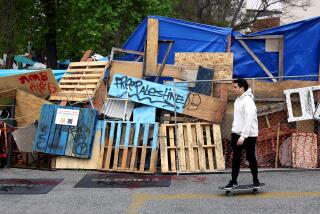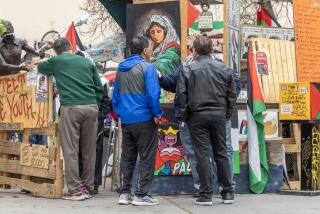“China’s policy of ‘to each according to his work’ is a socialist principle.”
- Share via
California State University, Northridge, the campus that has long been the victim of a “Where’s that?” syndrome, even in its native Los Angeles, pulled off a modest diplomatic coup this week that may help to spot it on the map of international relations.
Han Xu, the newly appointed ambassador from the People’s Republic of China, gave his first speech in the United States at the Northridge campus Monday morning, opening the university’s second Conference on China, concluding today.
About 600 students and faculty members passed up some rousing fraternity football on the quad and a Wellness Decathlon in the Student Union courtyard to hear Han give a diplomat’s account of the changes that are going on in Chinese society.
As they filed into the Student Union’s San Fernando Hall, Han and University President James Cleary, who wore a red blazer, sat together at the end of a long white table.
Cleary rose first. He said it should be no surprise that a diplomat of Han’s stature would choose to make his American debut at CSUN rather than the more illustrious institutions over the hill.
“Since 1978, when California State University at Northridge began an ongoing relationship with China . . . CSUN has sent three official delegations to the People’s Republic of China, two of which I was privileged to lead,” Cleary said.
He said CSUN has signed exchange agreements with 13 Chinese universities and has received 25 delegations and special study groups of Chinese professors and scientists.
“So it is a fitting capstone to a very productive and educational period of interaction . . . to have ambassador Han as the keynote speaker today,” he said.
Han, handsomely trim in a well-cut, gray suit, stepped to the lectern with diplomatic formality. Then he flashed a friendly smile.
He read from a prepared text in English that was precise in wording though sometimes halting in delivery.
He apparently knew about the “Where’s that?” rap against Northridge.
“When I decided to accept President Cleary’s invitation, I thought I was going to North California,” he said. “The address ‘Northridge, California,’ seemed to suggest this campus must be somewhere at the northern tip of a tremendous mountain ridge in California.”
That won a laugh and Han seemed to like it.
He was direct and upbeat about the changes going on in China. At times he was almost poetic.
“Ladies and gentlemen, through the waves and tides of the Pacific, one can feel the pulse of China’s Socialist modernization,” Han said.
He said China has suffered from some of her own policies, among them an egalitarian approach to income distribution, arbitrary pricing and excessive central planning, and was taking measures to correct the errors.
“But does this mean China is going down the capitalist road?” he asked. “The answer is a definite ‘no.’ After all, China’s current policy of ‘to each according to his work’ is a Socialist principle. . . .”
If the dialectic was just a bit fuzzy, no one objected, even as he pursued it:
“True, under the reform, some people may get rich faster than others as they work harder and show more ingenuity. But this does not mean polarization. Other people’s life is improving, too. Together, they are heading toward common prosperity.”
The message seemed well received, as was Han’s renunciation of any fear of Western culture’s corrupting his homeland.
“A people with 5,000 years of civilization will be wise enough to absorb the good things, and mature enough not to pick up the trash abandoned by most Westerners themselves,” he said. “Incidentally, people have different taste. For instance, I prefer tap dance to disco.”
Ambiguous as the statement was, it produced another laugh.
Near the end of the speech, Han briefly mentioned a few differences his government still has with the United States. Among them were restrictions on technology transfer, import barriers and, of course, differing views on Taiwan.
“I hope the above obstacles will be cleared away,” he said, not budging an inch from his optimistic stance.
Then he quoted Chinese President Li Xiannian’s speech at the White House last summer:
“ ‘Like a sapling, our relations have to be cared for in order to grow tall and sturdy.’
“With President Li’s words still echoing round our hall, I think it is time for me to conclude my speech.”
Han then fielded questions that were tough but polite.
Students asked him to explain China’s border conflicts with Vietnam (they are Vietnam’s fault), her policy on nuclear energy (China wants it) and on Taiwan (it belongs to China).
He ducked only one question, when a young woman asked him, in light of China’s policy of nonintervention, to comment on the U. S. intervention in Nicaragua.
That caused a few embarrassed gasps in the audience.
With a smile, Han simply declined to answer.
Afterwards, Han shook hands with a few dozen students and faculty members.
Then two young reporters from a Chinese-language cable television channel and newspaper questioned Han intensely for several minutes about Taiwan and China’s relations with Chinese Americans. The repartee was in Chinese, and Han smiled all through it and seemed to enjoy the exchange.
But when an aide pulled him away, the two reporters just shrugged. What had they learned?
“The same answers you get from diplomats,” one said.
More to Read
Sign up for Essential California
The most important California stories and recommendations in your inbox every morning.
You may occasionally receive promotional content from the Los Angeles Times.











